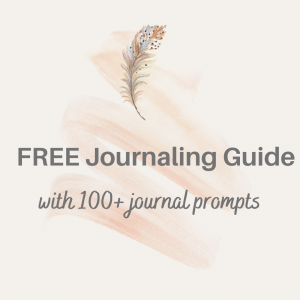The Joy of Journaling: Katherine Mackenzie-Smith

Katherine’s “gentle” approach has ensured her journaling practice is an intuitive tool, rather than a daily discipline. By journaling when she feels like it, and not because she “should”, Katherine has found journaling extremely effective for clearing her head and consolidating her thoughts. Here are some of Katherine’s other tips on journaling:
1. Why do you keep a journal? What do you think are the main advantages of journaling?
I love journaling as a way to sort out all my thoughts, clear my head, and get a bigger picture perspective from my emotions and my busy mind. I’ve always found journaling helps me to remove myself from my own thoughts, take a step back, and release or sort out what’s really going on. Sometimes it’s helpful just to shift energy and let go of old thoughts.
2. How long have you kept a journal for and why did you start?
I’ve been journaling since I was a kid. As a highly sensitive introverted soul who struggled quite a bit as a kid, I often felt misunderstood and that I didn’t really have the tools to properly communicate what was going on for me. I found journaling a way to take care of myself, get out my thoughts and emotions, and create some clarity around what was going on so I could communicate better and work out what was going on for myself.
3. How often do you write in your journal – have you established a regular habit, or do you just write when you need to? How much do you write?
I go through phases with my journaling, but the thing I’ve most learnt is to be gentle with myself. I find that I journal when I’m feeling most stuck or unsure what to do next and it intuitively feels like what I need to do to move through it. But then sometimes I won’t write anything for months. It just depends, but it always has to feel good instead of just doing it because I ‘think I should’.
4. What sort of journal do you write in? Do you write by hand in a notebook or electronically on your computer or other device?
I very specifically write with a hard cover notebook and pen. I try and keep my journal separate from where I write client notes, plan or strategise in my business, and my daily to-do list stuff. My journal is specifically for getting everything out of my head and then things that need to be actioned get organised in Trello or in my day planner.
5. Do you have any challenges journaling, e.g. not writing as consistently as you’d like, not having time to write, not knowing what to write, finding the right journal, etc.
The more I’ve learnt to let go of what I think journaling ‘should’ be, the easier it has become to use it as a tool that is exactly what I need it to be in the moment. Once we start feeling bad for not doing it the ‘right’ way or as often as we should, that’s when it starts to feel more like a burden and defeats the purpose of it.

Katherine Mackenzie-Smith is a business coach and energy mentor for introverts and highly sensitive people trying to cut through the noise and create sustainable success on their own terms. Learn more about Katherine at www.katherinemackenziesmith.com
